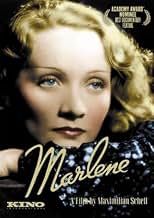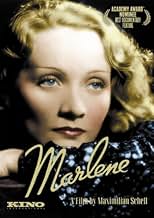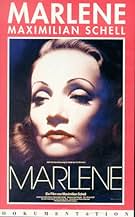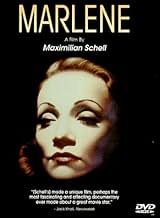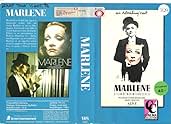Retrospective on the career of enigmatic screen diva Marlene Dietrich.Retrospective on the career of enigmatic screen diva Marlene Dietrich.Retrospective on the career of enigmatic screen diva Marlene Dietrich.
- Director
- Writers
- Stars
- Nominated for 1 Oscar
- 5 wins & 2 nominations total
- Director
- Writers
- All cast & crew
- Production, box office & more at IMDbPro
Featured reviews
A documentary retrospective on the career of enigmatic screen diva Marlene Dietrich.
I do not really know much about Marlene Dietrich. I have seen a few of her better known films, such as "Blue Angel", but know almost nothing about her personally. This documentary was good for fixing that, really allowing her to tell her story in her own words.
Apparently she did not want to be filmed, but agreed to be recorded. I actually think this makes for a better film. It allows for more footage to be shown, which is great when so many of her earlier works are hard to track down. Also, it serves little purpose to show her as an elderly woman... I mean, especially now that we saw how much better the screen time can be used.
I do not really know much about Marlene Dietrich. I have seen a few of her better known films, such as "Blue Angel", but know almost nothing about her personally. This documentary was good for fixing that, really allowing her to tell her story in her own words.
Apparently she did not want to be filmed, but agreed to be recorded. I actually think this makes for a better film. It allows for more footage to be shown, which is great when so many of her earlier works are hard to track down. Also, it serves little purpose to show her as an elderly woman... I mean, especially now that we saw how much better the screen time can be used.
Yet, HERE! Perhaps the most intimate documentary ever filmed.
An 82-year old legend who refuses to be photographed, yet whose voice alone raises hackles, cackles and longing over a brilliant assemblage of stock and custom footage.
As much as anything, "Marlene" is a film about trying to film somebody: trying to know somebody.
"Nein, nein, nein," it begins. "No, no no," Marlene instantly dismisses us and this documentary.
Its last word, from Dietrich's own lips, finally resigned, crying softly, is, "Maybe." One of the most haunting, heartbreaking films ever made.
Never has there been as deep a glance into any other screen Goddess' life as this.
Ironic. The most private, iconic of early screen actresses, extends her career for nearly sixty years -- including live performances around the world (unlike, say, Greta Garbo) and culminates in one of the more enigmatic yet fulfilling performances of the century with her voice alone in "Marlene." Thanks solely to Maximillian Schell, whose genius as a film maker rose to Dietrich's genius as a tart risen to lady and finally to goddess.
"Maybe." Indeed.
An 82-year old legend who refuses to be photographed, yet whose voice alone raises hackles, cackles and longing over a brilliant assemblage of stock and custom footage.
As much as anything, "Marlene" is a film about trying to film somebody: trying to know somebody.
"Nein, nein, nein," it begins. "No, no no," Marlene instantly dismisses us and this documentary.
Its last word, from Dietrich's own lips, finally resigned, crying softly, is, "Maybe." One of the most haunting, heartbreaking films ever made.
Never has there been as deep a glance into any other screen Goddess' life as this.
Ironic. The most private, iconic of early screen actresses, extends her career for nearly sixty years -- including live performances around the world (unlike, say, Greta Garbo) and culminates in one of the more enigmatic yet fulfilling performances of the century with her voice alone in "Marlene." Thanks solely to Maximillian Schell, whose genius as a film maker rose to Dietrich's genius as a tart risen to lady and finally to goddess.
"Maybe." Indeed.
I've seen another documentary on Marlene Dietrich and also read her daughter's book. I was interested in this one for a bizarre reason- I once sat on the New York subway next to someone who had the script of this documentary with him. Being a big fan of Maximilian Schell's, I wanted to see it.
Schell, who appeared with Dietrich in "Judgment at Nuremberg," was able to convince the actress to do this documentary, but she would not permit herself to be shown on camera.
She was last seen in the 1978 film Just a Gigolo, heavily made up and behind a veil, but still looking mighty good to me. But if one reads her daughter's book, it's easy to see that as she aged, she became a little eccentric. She spent the last 11 years of her life bedridden and allowed very few people to see her.
So the famous Dietrich voice supplies a narration of sorts to the glorious film clips, clips of her in newsreels, and film of her doing her one-woman show. It is all glorious, showing how she evolved over the years, her excellent acting in films like "Judgment at Nuremberg," "Witness for the Prosecution," and "Touch of Evil," and the incredible charisma and beauty she shared with the audience in her show.
At one point, Schell offends her and she lays into him. making a remark about him being a "Swiss", and telling him she'd sat at tables with politicians and dignitaries and no one had ever spoken to her like that. She went on for a while. Schell punctuates her words with images of flying film strips and a whizzing, distorted background.
She could be abrupt, but also emotional as she recites a favorite poem of her mother's.
Dietrich talks like she hated making movies, didn't do much to get into a role, her private life was private. It's hard to say now. One thing that wasn't gone into was her passion for Jean Gabin, nor was much of the documentary focused on her war work.
Marlene Dietrich was a magical personality, an exotic beauty, a wonderful actress, and a magnificent performer. This documentary gives us plenty of examples of her magic and, if you don't appreciate her now, you will after seeing this.
She was the kind of star we won't see again - androgynous, earthy, and very much of her time. In her eighties when this was made, her attitude is very much like her final words in Touch of Evil: "What does it matter what you say about people?"
Schell, who appeared with Dietrich in "Judgment at Nuremberg," was able to convince the actress to do this documentary, but she would not permit herself to be shown on camera.
She was last seen in the 1978 film Just a Gigolo, heavily made up and behind a veil, but still looking mighty good to me. But if one reads her daughter's book, it's easy to see that as she aged, she became a little eccentric. She spent the last 11 years of her life bedridden and allowed very few people to see her.
So the famous Dietrich voice supplies a narration of sorts to the glorious film clips, clips of her in newsreels, and film of her doing her one-woman show. It is all glorious, showing how she evolved over the years, her excellent acting in films like "Judgment at Nuremberg," "Witness for the Prosecution," and "Touch of Evil," and the incredible charisma and beauty she shared with the audience in her show.
At one point, Schell offends her and she lays into him. making a remark about him being a "Swiss", and telling him she'd sat at tables with politicians and dignitaries and no one had ever spoken to her like that. She went on for a while. Schell punctuates her words with images of flying film strips and a whizzing, distorted background.
She could be abrupt, but also emotional as she recites a favorite poem of her mother's.
Dietrich talks like she hated making movies, didn't do much to get into a role, her private life was private. It's hard to say now. One thing that wasn't gone into was her passion for Jean Gabin, nor was much of the documentary focused on her war work.
Marlene Dietrich was a magical personality, an exotic beauty, a wonderful actress, and a magnificent performer. This documentary gives us plenty of examples of her magic and, if you don't appreciate her now, you will after seeing this.
She was the kind of star we won't see again - androgynous, earthy, and very much of her time. In her eighties when this was made, her attitude is very much like her final words in Touch of Evil: "What does it matter what you say about people?"
Maximilian Schell's documentary portrait of legendary screen siren Marlene Dietrich separates the woman from her myth, but because Dietrich herself refused to appear on camera the director was presented with a dilemma: how to construct the film without its subject? His clever (if desperate) solution was to document, instead, his own frustration in making the film, using Dietrich's disembodied, tape recorded voice to supplement scenes of the director scrambling for cohesive footage.
Surprisingly, the finished film (messy as it often is) creates a remarkably full picture of the reclusive star, despite (and in large part because of) her absence. Dietrich's voice alone – obstinate, caustic, skeptical of Schell's project, scornful of her own allure – says more (with more insight) than any scripted monologue could provide, and her unedited conversations with Schell (an old comrade) are unpredictable and candid, often becoming verbal sparring matches in two languages.
Surprisingly, the finished film (messy as it often is) creates a remarkably full picture of the reclusive star, despite (and in large part because of) her absence. Dietrich's voice alone – obstinate, caustic, skeptical of Schell's project, scornful of her own allure – says more (with more insight) than any scripted monologue could provide, and her unedited conversations with Schell (an old comrade) are unpredictable and candid, often becoming verbal sparring matches in two languages.
Highlights of this brilliant documentary film must include Deitrich's opinions of directors she worked with. For example Orson Welles was a genius (`Cross yourself before you mention his name'!) She appeared in `Touch of Evil' without a fee when Welles couldn't raise finance. Von Sternberg always made things difficult for her so that she would use her brain and learn something whereas Fritz Lang was a `monster' who had her marks chalked on the floor when she arrived on set but his stride was much longer than hers. Then there's the controversy of Billy Wilder denying Marlene an Oscar opportunity for her superb performance in `Witness for the Prosecution'
`Marlene' includes generous extracts from many of her movies from the silent era in Germany to her final role in `Just a Gigolo' with many gems in between. Deitrich claims never to have watched her own films but director Schell runs excerpts on a video machine and gets her comments.
She also talks about her contribution to the Allied war effort, the desire of the German people for strong leadership and her contempt for Hitler.
Schell & Deitrich, who appeared together in ` Judgement at Nuremberg' often disagree sharply, and listening to Marlene hold her end up in the exchanges it's easy to forget that she was 82 years old when this documentary was made in 1983.
Summing up, `Marlene' is a must-see for anyone interested in older movies and her rendition of `See what the boys in the back-room will have' from `Destry Rides Again' alone is worth the money.
`Marlene' includes generous extracts from many of her movies from the silent era in Germany to her final role in `Just a Gigolo' with many gems in between. Deitrich claims never to have watched her own films but director Schell runs excerpts on a video machine and gets her comments.
She also talks about her contribution to the Allied war effort, the desire of the German people for strong leadership and her contempt for Hitler.
Schell & Deitrich, who appeared together in ` Judgement at Nuremberg' often disagree sharply, and listening to Marlene hold her end up in the exchanges it's easy to forget that she was 82 years old when this documentary was made in 1983.
Summing up, `Marlene' is a must-see for anyone interested in older movies and her rendition of `See what the boys in the back-room will have' from `Destry Rides Again' alone is worth the money.
Did you know
- TriviaDirector Maximilian Schell got Marlene Dietrich to agree to appear in this documentary only on the stipulation that she not be photographed as she looked at the time. Instead, we only hear her in interviews.
- GoofsThe documentary states that "Dietrich" was the maiden name of Marlene's mother. This is completely untrue. Wilhelmina Dietrich was born Wilhelmina Felsing. Dietrich was the name of Marlene's biological father, Louis Dietrich, after whose death Wilhelmina married Eduard von Losch, who thereby became Marlene's stepfather.
- Quotes
[Last line, to director Maximilian Shell about this film]
Marlene Dietrich: You never sell that in America.
Details
- Release date
- Country of origin
- Languages
- Also known as
- Marlene: An Astonishing Visit
- Production companies
- See more company credits at IMDbPro
Box office
- Gross US & Canada
- $852,676
- Opening weekend US & Canada
- $14,490
- Nov 9, 1986
- Gross worldwide
- $852,676
Contribute to this page
Suggest an edit or add missing content

